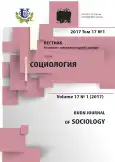Political economy of agrarian change: Some key concepts and questions
- Authors: Bernstein H1
-
Affiliations:
- University of London
- Issue: Vol 17, No 1 (2017)
- Pages: 7-18
- Section: Theory, Methodology and History of Sociological Research
- URL: https://journal-vniispk.ru/2313-2272/article/view/340482
- DOI: https://doi.org/10.22363/2313-2272-2017-17-1-7-18
- ID: 340482
Cite item
Full Text
Abstract
This paper draws on lectures given in recent years at the China Agricultural University, on author’s book Class Dynamics of Agrarian Change [1] and on a recent article [3]. The author supplied as few references as possible to very large literature in English on agrarian change both historical and contemporary; there is an ample bibliography in [1], which is expanded in [2-5]. The paper outlines in schematic fashion some key concepts in the political economy of agrarian change with special reference to capitalism historically and today; some key questions posed by the political economy of agrarian change, and how it seeks to investigate and answer them; two sets of more specific questions about agrarian transition to capitalism and agrarian change within capitalism (internal to the countryside, bringing in rural-urban interconnections, pointing towards the place of agriculture within larger ‘national’ economies, and concerning the character and effects of the capitalist world economy). With the aid of the last group of questions, the author discusses three themes, which they are deployed to investigate: the agrarian origins of capitalism, the distinction between farming and agriculture generated by capitalism, and the fate(s) of peasant farmers in the modern world of capitalism. The author believes that one cannot conceive the emergence and functioning of agriculture in modern capitalism without the centrality and configurations of new sets of dynamics linking agriculture and industry, and the rural and urban, and the local, national and global. The three themes all feed into the fourth and final theme, that of investigating the fate(s) of the peasantry in capitalism today, which resonates longstanding debates of the ‘disappearance’ or ‘persistence’ of the peasantry, albeit now in the conditions of contemporary ‘globalization’. The author does not deny some of the critique of the contemporary globalization, or at least its effects; his problem is the advocacy of ‘solutions’ premised on an unconvincing, pre-given and idealized ‘peasant way’ that lacks the analytical means (and desire) to confront processes of class formation in the countryside.
About the authors
H Bernstein
University of London
Author for correspondence.
Email: henrybernstein@hotmail.co.uk
Senate House, Malet St., London WC1E 7HU, UK
References
- Bernstein H. Class Dynamics of Agrarian Change. Halifax: Fernwood, 2010.
- Bernstein H. Food sovereignty via the “peasant path”. A sceptical view. Journal of Peasant Studies. 2014;41(6):1031-1063.
- Bernstein H. Some reflections on agrarian change in China. Journal of Agrarian Change. 2015;15(2):454-477.
- Bernstein H. Agriculture/industry, rural/urban, peasants/workers: some reflections on poverty, persistence and change. Poverty and Persistence of the Peasantry. J. Boltvinik, S.A. Mann (Eds.). L.: Zed Books, 2016.
- Bernstein H. Revisiting agrarian transition: reflections on long histories and current realities. Critical Perspectives in Agrarian Transition: India in the Global Debate. B. Mohanty (Ed.). L.: Routledge, 2016.
- Brenner R. The Low Countries in the transition to capitalism. Journal of Agrarian Change. 2001;1(2):169-241.
- Chayanov A.V. The Theory of Peasant Co-operatives. L.: I.B. Tauris, 1991.
- Cronon W. Nature’s Metropolis. Chicago and the Great West. N.Y.: W.W. Norton, 1991.
- Crosby A.W. Ecological Imperialism. The Biological Expansion of Europe, 900-1900. Cambridge: Cambridge University Press, 1986.
- Friedmann H. The political economy of food: A global crisis. New Left Review. 1993;197:29-57.
- Friedmann H. Feeding the empire: the pathologies of globalized agriculture. The Socialist Register 2005. L. Panitch, C. Leys (Eds.). L.: Merlin Press, 2004.
- Friedmann H., P. McMichael. Agriculture and the state system: the rise and decline of national agricultures, 1870 to the present. Sociologica Ruralis. 1989;29(2):93-117.
- Marx K. Grundrisse. Harmondsworth: Penguin Books, 1973.
- Weis T. The Global Food Economy. The Battle for the Future of Farming. L.: Zed, 2007.
- Wolf E. Peasants. Upper Saddle River NJ: Prentice Hall, 1966.
Supplementary files









